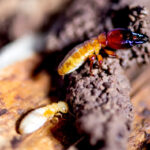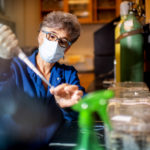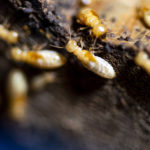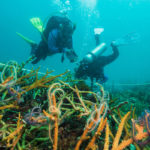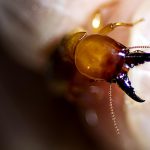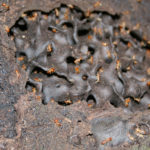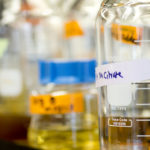About Rebeca Rosengaus
Prof. Rosengaus’ research tries to understand the factors that may have selected for the evolution of termite sociality. She has hypothesized that pathogens and/or parasites may have played important selection forces that favored the evolution of complex insect societies.
This evolutionary question is studied by focusing on the adaptations that termites have evolved in order to resist disease. Termites nest, feed and forage in microbially-rich environments and their colonies are composed of thousands of individuals which could easily become infected either through the direct contact with pathogens or indirectly through the social interactions among nestmates.
Yet, in spite the high risks of infection, termites thrive within their nests. What are the means by which these insects cope with disease? What are the costs and benefits of group-living with respect to disease susceptibility and disease resistance? Prof. Rosengaus’ research has established that termites use several, and often simultaneous mechanisms to reduce the risks of infection, including behavioral, biochemical, immunological and social adaptations.
This line of work has expanded to consider the role of pathogenic microbes on the evolution of both termite mating strategies and social immunity whereby social interactions facilitate disease resistance at the colony-level. Additionally, the role of the termites’ microbiome on social immunity and transgenerational immune priming are currents areas of interest
Dr. Rosengaus’ research tries to understand the factors that may have selected for the evolution of insect sociality. This work is at the interface of evolutionary biology, behavioral and chemical ecology, immunology and genetics. Social insects represent excellent social test organisms to answer questions about the emerging field of “socio-eco-immunology”. Field work takes place at the Smithsonian Tropical Research Institute in Panama and at the Redwoods in California.
Publications:
-
Thompson FJ, Hunt KL, Wright K, Rosengaus RB, Cole EL, Birch G, Maune A, Cant MA (2020) Who goes there? Social surveillance as a response to intergroup conflict in a primitive termite. Biol. Lett. 20200131.Read
-
Google ScholarRead
-
Cole EL, Bayne H, Rosengaus RB (2020). Young but not defenseless: Constitutive antifungal activity during embryonic development of a social insect. Royal Society Open Science 7: 191418.Read


